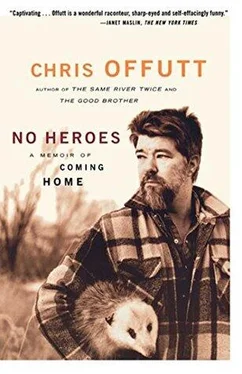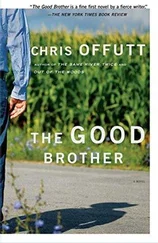Soup Beans and Corn Bread
I had lunch with my mother at the Dixie Grill. It was unusual for us to have a private meal, one of the rare times when I saw her actually eat. My mother attended MSU for two decades, and now worked for a nonlitigating lawyer, an old family friend. Her job included greeting people as they entered his office. She had never held a job when I lived here, and it pleased me to take my mother out during her lunch break.
The Dixie Grill is a small room filled with tables and chairs — no booths. When my mother and I entered, everyone looked to see who we were. We followed etiquette by sweeping the area with our vision and settling on someone to smile at. People never feel hurt if you don’t wave to them personally. They understand that you are merely obeying custom by showing the crowd that you’re not a snob. All of this is surreptitious of course, with no sense of choreography or awareness. It’s simple convention. Staring is not considered rude here. In fact, the opposite is true — failing to acknowledge someone is a much worse social gaffe. Staring at strangers is common because you must try to figure out who the person is related to, if you know the family, and if you are perhaps distant kin. One of these scenarios holds true, because there are no strangers in the hills. People don’t come here unless they are visiting relatives.
The Dixie Grill’s menu is traditional mountain fare— fried, fatty, starchy, and sweet. There is no designated smoking section, which is to say the entire restaurant is a smoking section. My mother and I ordered the daily special of soup beans, mixed greens, and corn bread. To eat properly, you douse the damp clump of greens with vinegar, and crumble your corn bread into your soup beans. We looked at each other across the table. My mother seemed to enjoy the idea of eating lunch with me more than the actual experience.
“How are the boys?” she said.
“Pretty good. Sam’s not too happy with school.”
“You always liked school.”
I ate a bite of soggy corn bread.
“Are things all right with you,” I said.
“Great.”
“And Dad?”
“Great.”
“How about the house?” I said. “The new roof?”
“Great. I’m so glad you’re here. This is the busiest time of the busiest restaurant in Morehead.”
“Great,” I said.
There were perhaps twenty tables in the room, four of which were empty. My mother kept glancing around to see who saw us together. Other people were likewise engaged, which slowed the pace of eating. Many people were there merely to be seen — businesspeople communicating liaisons to the world, couples showing everyone that their marital problems were repaired, bosses eating with employees to display good relations. No one lunched alone at the Dixie Grill.
A boy I’d grown up with came by the table to say hello. He was balding now and I remembered when a VISTA worker took him to a dentist. The next day he brought a toothbrush to school. Since he’d never seen one, he figured none of us had either. I inquired about his six brothers and four sisters. He worked at Guardian, the only industry around, a manufacturer of ball bearings. They tried to unionize but failed. He still lived in Haldeman, but was thinking of moving.
“They built that new school,” he said, “but it ain’t the same,” he said. “They combined Haldeman and Elliotville, and make those babies ride a bus twelve miles. Parents don’t go to PTA meetings because it’s too far away.”
“Don’t they use the school for anything?”
“To vote in. They closed the voting house. But they’re going to open it again because so many people quit voting when they changed it.”
“Why’d they close the voting house?”
“No bathroom,” he said. “The state says you got to have a bathroom. Shoot, there’s some folks would vote just to use the bathroom.”
I laughed and he returned to his table. My mother smiled brightly to a person across the room.
“You know, Chris,” my mother said. “I liked it better when you lived in Albuquerque.”
“What?”
“I could visit.”
I continued to nod, my head slowly moving like a marionette in the wind. To reach the rest room I had to step into a narrow hall at the rear of the restaurant. The men’s room was occupied. I glanced around and quickly went into the women’s room, where I splashed cold water on my face and wrists. As I emerged, an older woman was slowly coming through the door. She stared at me, utterly aghast to find a man in the ladies’ room. She was a retired high school teacher and she withered me with a look, shaking her head as if to say, “Christopher, you may have gone off and come back, but you have not grown up one bit.”
I paid the bill and said hello to my freshman composition teacher from college. I nodded to a man I’d once bought marijuana from. I opened the door for my high school typing teacher, a woman I held in high esteem.
I walked my mother back to her job at a new building that had formerly housed a Laundromat. She smiled at the door, resuming her role as a sixty-five-year-old employee in an olive skirt, the ubiquitous green of a redhead. Her hair was a different color now, but her taste in clothes was the same. She thanked me for lunch, straightened her skirt, lifted her chin, and gave me the smile of a receptionist seeing a person out. She nodded once and turned away. I watched the door close after her.
I realized that I knew very little about my mother’s life, and that lunch had offered no insight. I didn’t even know if she was happy. I hoped that my coming home would allow her to open herself to me. She never talked of her childhood and had told me nothing of her mother. I don’t even know my grandmother’s name. She died young.
When I was a child, some wild boys drove a hot rod along the dirt road on our hill. It was jacked-up in the back with short pipes that produced a rhythmic roar. A large black swastika was painted on each door. I had never seen that symbol before. I thought the car was cool, the driver was cool, the loud music roaring was cool. I especially thought the swastika was cool. For some reason I decided to carve it into the lid of a wooden box on my mothers dresser. I was about ten years old. I used the sharp end of a diaper pen. When my father asked if I had done it, I said yes and told him about the car. He said the box had belonged to my grandmother. It was the only item my mother had from her. I never saw the box again.
There were women working in camp also that came from the outside. I met this woman and she told me she worked in a restaurant. She was from the same city as I was. She was a pretty girl. Simple but crazy. She said to me, why don’t you say to your boss over there I am a good cook.
So I said to my boss, maybe you want a good cook here. Maybe somebody want to cook a good meal for you.
He said, do you know her?
I said, ya, ya, she’s a good cook.
So she cooked him a meal. It was good and he hired her as an official cook for him. She came every day and the next thing I know, she sleeps with him. She wants to stay in the camp and there’s a house adjacent. Nobody lives there. We used it mostly for storage. I tell the boss, why don’t we fix the house up, you could have a nice house there. So he gave me a couple of men. I paint and fix and put electric wiring in. A bathroom I make.
She moved in with him. He made her chief of providing all the supplies from there to us. The woman, she’s not a friend of mine anymore. She orders me around like a big shot. She is the lady with her slave. She goes sometimes to the other camp where my wife is. I said to her, do me a favor and give my wife my bread. She tells me, ya, I leave it. I said, how’s my wife? She said, fine. I found out after the war she’s playing games with me, she doesn’t do this. I thought that my wife got the food. She didn’t. My wife never got anything. It was the only time I was happy, and it was not real.
Читать дальше












